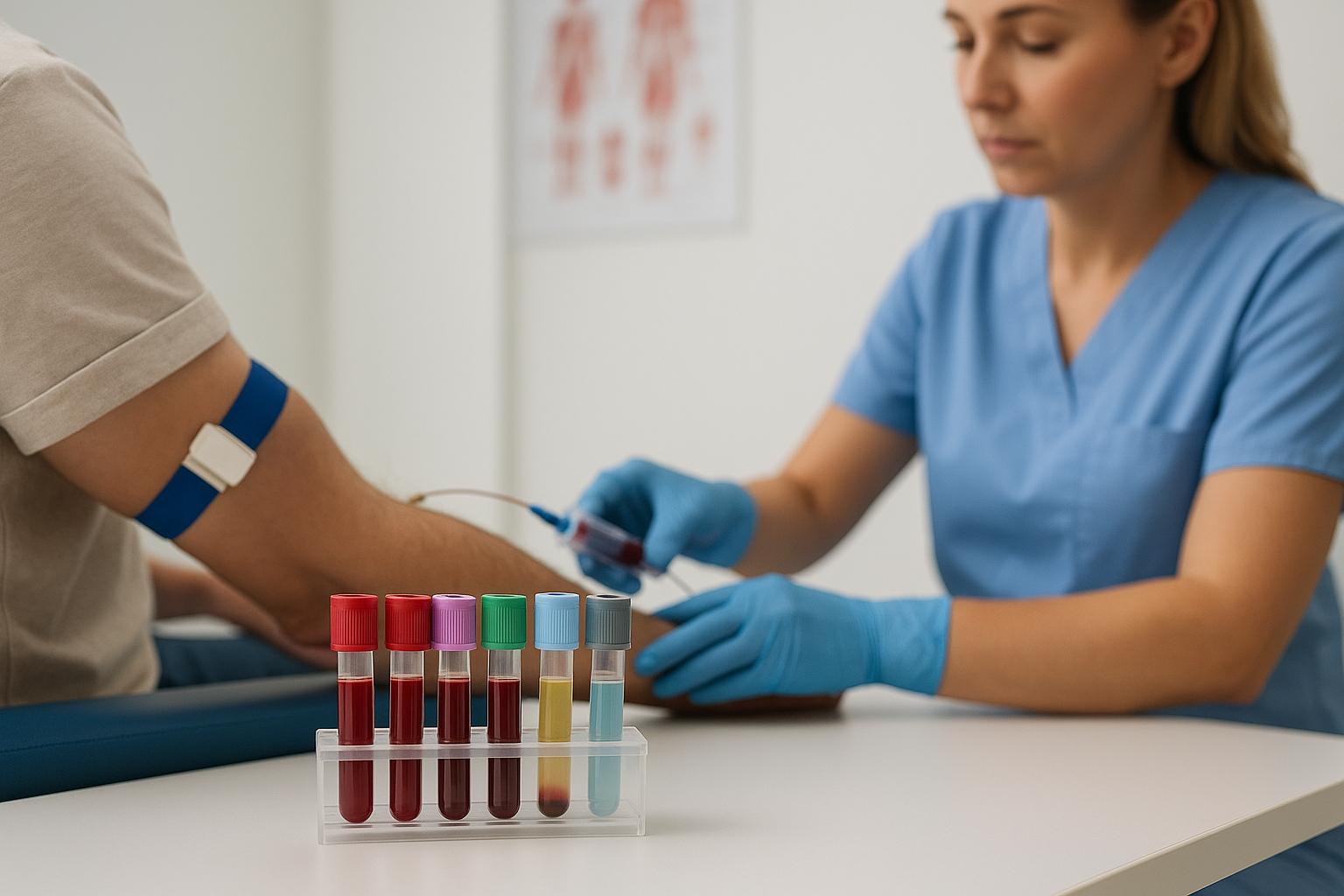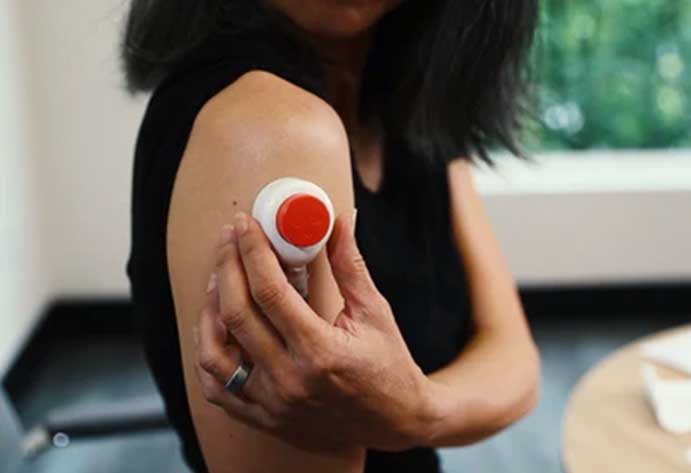
Home blood collection significantly reduces stress-induced alterations in critical health markers while providing more accurate baseline readings. HealthieOne's minimal blood requirement (less than 1 mL vs. 30+ mL for comprehensive panels) eliminates physical stress while advanced metabolomics technology delivers deeper health insights than traditional testing.
The Stress Response: How Lab Visits Sabotage Your Health Data
When you walk into a medical facility for blood work, your body doesn't just experience minor nervousness, it launches a complex physiological cascade that can dramatically alter the very biomarkers you're trying to measure. This phenomenon, rooted in our evolutionary fight-or-flight response, transforms what should be accurate health data into a distorted health profile influenced by acute stress.
The White Coat Syndrome Epidemic

White coat syndrome affects up to 20% of the population, causing blood pressure to surge specifically in medical settings while remaining normal at home1. But the impact extends far beyond blood pressure readings. Research shows that improving the relationship between patients and healthcare providers can decrease anxiety, with the implication of decreasing white coat hypertension2, yet this doesn't address the fundamental issue: the clinical environment itself triggers stress responses that contaminate test results.
For people with generalized anxiety, sitting in a doctor's office might cause worry and stress to the point that it increases blood pressure3. More concerning, research suggests there's an association between long-term cardiovascular issues and white coat syndrome, indicating that this isn't merely a measurement issue but a health risk factor2.
The Physiological Cascade: When Stress Rewrites Your Biology
The moment you enter a medical facility, your hypothalamic-pituitary-adrenal (HPA) axis activates, triggering a cascade of hormonal and metabolic changes that directly impact the biomarkers being tested4. Cortisol, synthesized from cholesterol as the main glucocorticoid, is secreted from the adrenal cortex in response to biochemical stress5.
This stress response creates a domino effect across multiple biological systems:
Cardiovascular Stress Markers:
- Chronic high cortisol can lead to increased blood glucose and inflammation, affecting lipid metabolism and leading to dyslipidemia6
- Studies suggest that high levels of cortisol from stress can increase blood cholesterol, triglycerides, blood sugar, and blood pressure7
- Cortisol floods the bloodstream with glucose and narrows the arteries, while norepinephrine raises heart rate and increases blood flow to muscles8
Inflammatory Response:
- Higher levels of perceived stress are associated with flatter diurnal cortisol slopes, which in turn are associated with increased levels of inflammatory biomarkers9
- Studies show elevated levels of glucose, HbA1c, and TNF-alpha in stressed individuals, suggesting enhanced inflammatory responses and oxidative stress4
Immune System Disruption:
- High stress scores lead to increased leukocyte levels and several T cell counts above normal ranges4
- Among family dementia caregivers, increased daily stressors contribute to elevation in IL-6 and CRP levels4
The Comprehensive Lab Panel Ordeal: 30+ mL of Blood and Maximum Stress

Traditional comprehensive health panels require extensive blood draws—typically 6 or more vials totaling 30+ milliliters of blood. This process amplifies stress through multiple mechanisms:
Physical Trauma and Psychological Impact
The needle insertion, multiple vials, and extended procedure time create both physical discomfort and psychological distress. Fear of needles is a recognized phobia, listed in the DSM-IV (Diagnostic and Statistical Manual of Mental Disorders, fourth edition) manual, where needle-phobia experience panic attacks, lightheadedness, or fainting when exposed to needles10. This isn't just discomfort, it's a documented medical condition affecting a significant portion of the population.
The Compounding Stress Effect
Large blood draws create a perfect storm of stress factors:
- Anticipatory anxiety before the appointment
- Procedural stress during the extended draw
- Recovery anxiety about results and health implications
- Environmental stress from the clinical setting
As much as 20 percent of the population suffers from white coat syndrome, and fear is a response selected in evolution to promote immediate avoidance of physical threats: hospitals and clinics10.
HealthieOne's Revolutionary Approach: Less Than 1 mL for Maximum Insight
HealthieOne fundamentally reimagines health testing by requiring less than 1 mL of blood, a fraction of traditional comprehensive panels, while delivering over 220 biomarkers through advanced metabolomics technology.
The Minimal Blood Advantage

HealthieOne provides the best value compared to other health testing services, given the number of health markers and depth of results, requiring only a very small amount of blood to get the full panel11. This minimal blood requirement eliminates the physical trauma associated with large draws while maintaining comprehensive coverage.
The Tasso+ device sticks to your upper arm and collects blood after making a very tiny and painless incision, making blood collection painless and foolproof11. Users report being uncertain the device had worked until blood began flowing, a testament to its gentle approach.
The Home Environment Advantage: Your Baseline Biology
Cortisol Circadian Rhythm Preservation
Blood cortisol measurement timings have significant importance as cortisol increases in the early morning and decreases in the evening5. Home collection allows for optimal timing without the stress-induced cortisol spikes that occur in medical settings, providing a more accurate representation of your natural circadian rhythm.
Reduced Inflammatory Noise
By eliminating the acute stress response, home collection provides cleaner inflammatory marker readings. The interplay between cortisol, inflammatory markers, glucose, and lipids creates a complex picture of how stress affects the body6, home testing removes this confounding variable.
Accurate Cardiovascular Markers
Without the stress-induced elevation in heart rate and blood pressure, cardiovascular risk markers like lipid profiles, glucose levels, and inflammatory proteins reflect your true baseline status rather than an acute stress response8.
Specific Health Markers Affected by Testing Environment Stress
Glucose and Metabolic Markers
Increased serum glucose level is responsible for a single acute stressful event, representing an 'allostatic response'5. Lab-based testing may show artificially elevated glucose levels due to stress, potentially leading to:
- False diabetes risk assessments
- Incorrect HbA1c interpretations
- Misleading insulin resistance markers
Lipid Profiles and Cardiovascular Risk
Chronic high cortisol can affect lipid metabolism, leading to dyslipidemia6. Stress-induced cortisol release during lab visits can temporarily alter:
- Total cholesterol levels: Artificially elevated due to stress
- HDL/LDL ratios: Skewed by acute inflammatory response
- Triglycerides: Increased by stress-induced glucose release
Inflammatory and Immune Markers
Stress activates the inflammatory cascade through NF-κB, resulting in increased activity proportional to catecholamine and cortisol secretion8. This affects:
- C-reactive protein (CRP): Elevated levels, especially above 3.0 mg/dL, may indicate significant inflammation potentially linked to stress6
- Cytokine levels: IL-6, TNF-alpha artificially elevated4
- White blood cell counts: Stress-induced changes in leukocyte populations4
Hormonal Assessments
The HPA axis disruption during medical visits impacts multiple hormonal systems4:
- Cortisol levels: Peak stress response obscures baseline function
- Thyroid hormones: Stress can suppress TSH and alter T3/T4 ratios
- Sex hormones: Acute stress can temporarily suppress testosterone and estrogen production
The Psychological Health Benefits: Beyond Better Data
Elimination of Medical Anxiety
Health anxiety affects 5-10% of people equally across genders, with telltale signs including fearing illness despite having no symptoms and reassuring test results not bringing peace of mind. Home testing eliminates the anxiety-provoking medical environment entirely.
Empowerment and Control
Regularly taking readings in a familiar environment gives a more accurate reflection of blood pressure over time and helps understand how much blood pressure might change in response to clinical environments. This principle extends to all biomarkers—home testing provides authentic health data while restoring patient agency.
Reduced Healthcare Avoidance
Fear and anxiety prevent a significant minority of the population from getting vital care, with the problem growing in importance as medicine emphasizes preventive care. By removing the barrier of clinical environments, home testing enables proactive health monitoring for anxiety-prone individuals.
Long-term Health Implications:
Understanding Stress-Induced Disease Risk
Chronic stress can have serious impact due to sustained high levels of chemicals released in the fight-or-flight response, affecting immune, cardiovascular, neuroendocrine, and central nervous systems. Regular exposure to medical testing environments may contribute to this chronic stress burden.
The biomarkers of allostatic load could be used for measuring and predicting cumulative biological risks of impending illnesses, serving as ideal indicators for detecting the 'pre-phase' of illnesses. However, this requires accurate baseline measurements uncontaminated by testing-induced stress.
Cardiovascular Risk Assessment
Research suggests that long-term anxiety can increase the risk for sudden cardiac death. For individuals with medical anxiety, frequent lab visits may paradoxically increase cardiovascular risk while attempting to monitor it.
Studies suggest that high levels of cortisol from long-term stress can increase blood cholesterol, triglycerides, blood sugar, and blood pressure, common risk factors for heart disease. Home testing breaks this cycle by providing stress-free monitoring.
Making the Transition: Practical Steps for Better Health Monitoring
Preparing for Home Collection
The blood collection process takes about 20 minutes from start to finish and could be done faster, but going slow helps avoid mistakes. The process involves:
- Overnight fasting as instructed
- Morning collection during optimal circadian timing
- Warm-up procedures using included heat pads
- Painless collection with the Tasso+ device
- Same-day shipping with included FedEx overnight packaging
FDA Recognition: Home as the Future of Healthcare
The U.S. Food and Drug Administration has officially recognized the paradigm shift toward home-based healthcare through its groundbreaking "Home as a Health Care Hub" initiative. This comprehensive initiative focuses on catalyzing solutions supporting prevention, wellness, and management of a variety of chronic diseases and other health conditions, with medical devices serving purposes of prevention, diagnosis, treatment, rehabilitation, and monitoring, all within the home environment.
Regulatory Framework Supporting Home Innovation
The FDA's Idea Lab, a key component of the Home as a Health Care Hub initiative, was created specifically for developers to create new solutions and visualize how medical devices may fit into the lifestyles and homes of people while integrating well with other health technologies. This regulatory recognition validates what patients have long known: healthcare is more effective when delivered in comfortable, familiar environments.
The FDA's Home as a Health Care Hub initiative was developed through comprehensive literature review across four domains: clinical aspects, technology, housing design, and affordable housing. Input was received from subject matter experts and representatives of patient organizations, professional societies, medical device and consumer technology developers, and regulators13. This multi-stakeholder approach ensures that home healthcare solutions like HealthieOne meet both regulatory standards and real-world patient needs.
Key Regulatory Considerations for Home Healthcare
The FDA has identified crucial questions that home healthcare solutions must address:
Device Accessibility and Reliability:
- Can the device safely and effectively operate in homes that do not have a reliable internet source or who may have limitations in their power or water supply?
- Can the device safely and effectively operate in homes that do not have favorable lighting, acoustics, ergonomic, and air quality conditions?
Privacy and Integration:
- Will the device, with all accessories and supplies, fit into a person's home discreetly so as to maintain privacy and avoid constant reminders of the burden of managing their condition?
- Can the device be incorporated into other objects of daily life that a person is already using?
User Experience and Accessibility:
- Can the device be used correctly by people of varying physical, cognitive, sensory, and (digital- and health-specific) literacy functioning?
- Is the device cybersecure? And does it allow the person to choose if and with whom their information is shared?
HealthieOne exemplifies these FDA principles by providing a simple, at-home solution that requires minimal technical setup while maintaining clinical-grade accuracy and security.
The Future of Health Monitoring: Stress-Free, Comprehensive, Accessible
The evolution from traumatic lab experiences requiring large blood volumes to gentle home collection with minimal samples represents more than convenience—it's a paradigm shift toward more accurate, less stressful health monitoring that aligns with FDA's vision for the future of healthcare delivery.
The FDA's Home as a Health Care Hub initiative recognizes that medical devices can enable people to optimize their health and wellness where they live, supporting the delivery of care, wellness, and prevention in familiar environments. HealthieOne embodies this vision by transforming how we approach comprehensive health assessment.
HealthieOne provides a complete picture of health, revealing insights that only their extensive analysis and cutting-edge technology could deliver. By eliminating the stress-induced artifacts that contaminate traditional testing, home collection finally allows us to see our true biological baseline while meeting the FDA's stringent requirements for home healthcare innovation.
For the millions affected by medical anxiety, home testing isn't just better, it's the difference between accurate health data and stress-distorted measurements that can lead to inappropriate treatments or missed health opportunities. The future of personalized medicine, as endorsed by federal regulators, demands this level of precision delivered in patient-centered environments.
The choice is clear: Continue subjecting yourself to stress-inducing medical environments that contaminate your health data or embrace a technology that delivers deeper insights through gentler methods while meeting the FDA's gold standard for home healthcare innovation. Your biology, and your peace of mind, will thank you.
This article is based on peer-reviewed research from leading medical institutions including Johns Hopkins University, Mayo Clinic, Cleveland Clinic, and government health agencies. All claims are supported by published scientific literature and clinical studies.
References
- What Is White Coat Syndrome? Cleveland Clinic, June 2, 2025. Available at: https://my.clevelandclinic.org/health/diseases/23989-white-coat-syndrome - Clinical overview of white coat syndrome affecting up to 20% of population.
- White coat hypertension: improving the patient–health care practitioner relationship. PMC. Available at: https://pmc.ncbi.nlm.nih.gov/articles/PMC4427265/ - Clinical research on white coat syndrome prevalence and cardiovascular impacts.
- White Coat Syndrome: Signs, Causes, and Care. Psych Central, July 11, 2021. Available at: https://psychcentral.com/anxiety/all-about-white-coat-syndrome - Research on anxiety disorders and white coat syndrome association.
- Biomarkers in Stress Related Diseases/Disorders: Diagnostic, Prognostic, and Therapeutic Values. PMC, September 11, 2019. Available at: https://www.frontiersin.org/articles/10.3389/fmolb.2019.00091/full - Comprehensive review of stress biomarkers including cortisol, inflammatory cytokines, and oxidative markers.
- Technical and clinical aspects of cortisol as a biochemical marker of chronic stress. PMC. Available at: https://www.ncbi.nlm.nih.gov/pmc/articles/PMC4436856/ - Technical review of cortisol measurement and its relationship to chronic disease risk.
- Stress Impact on Blood Health: Tests, Tips. TRTL.Health, March 28, 2025. Available at: https://trtl.health/blogs/news/stress-impact-blood-health - Clinical review of stress effects on glucose, lipids, and inflammatory markers.
- Stress Can Increase Your Risk for Heart Disease. University of Rochester Medical Center. Available at: https://www.urmc.rochester.edu/encyclopedia/content?ContentTypeID=1&ContentID=2171 - Research on stress-induced cardiovascular risk factors.
- Chronic stress impacts the cardiovascular system: animal models and clinical outcomes. American Journal of Physiology-Heart and Circulatory Physiology. Available at: https://journals.physiology.org/doi/full/10.1152/ajpheart.00859.2014 - Research on stress-induced cardiovascular changes and biomarker alterations.
- Perceived stress is linked to heightened biomarkers of inflammation via diurnal cortisol in a national sample of adults. ScienceDirect, January 28, 2021. Available at: https://www.sciencedirect.com/science/article/abs/pii/S0889159121000192 - MIDUS study demonstrating how perceived stress leads to flattened cortisol slopes and increased inflammation.
- Beyond 'White Coat Syndrome'. WebMD, July 30, 2008. Available at: https://www.webmd.com/anxiety-panic/features/beyond-white-coat-syndrome - Research on medical anxiety prevalence and health impacts.
- 'HealthieOne Complete' Review | Our In-Depth Experience. Health Test Review, 2025. Available at: https://healthtestreview.com/healthieone-complete-review/ - Independent review of HealthieOne testing methodology and results.
- HealthieOne Complete Test. HealthieOne. Available at: https://healthieone.com/ - Technical specifications and methodology for advanced metabolomics testing.
- Imagine Home as a Health Care Hub through the Idea Lab. U.S. Food and Drug Administration. Available at: https://www.fda.gov/medical-devices/home-health-care-hub/idea-lab - FDA initiative supporting home-based healthcare innovation.
- The Effects of Stress on the Heart. MedStar Health. Available at: https://www.medstarhealth.org/blog/heart-and-stress - Clinical evidence of stress impact on cardiovascular biomarkers.
- Physiological biomarkers of chronic stress: A systematic review. PMC. Available at: https://pmc.ncbi.nlm.nih.gov/articles/PMC8434839/ - Comprehensive review identifying cortisol, inflammatory markers, and metabolic changes as key stress biomarkers.

No comments yet. Be the first!